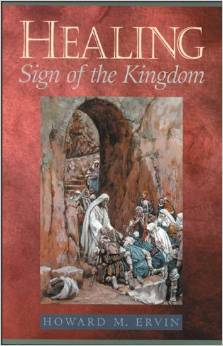Howard Ervin: Healing
 Howard M. Ervin, Healing: Sign of the Kingdom (Peabody, MA: Hendrickson Publishers, 2002), 116 pages.
Howard M. Ervin, Healing: Sign of the Kingdom (Peabody, MA: Hendrickson Publishers, 2002), 116 pages.
This is a wonderful little book on the significance of healing in the earthly ministry of Jesus. Howard Ervin rightly notes that the focal point of Jesus’ ministry was the Kingdom of God that is coming and was already made present in him. Healing, according to Ervin, played a pivotal role in emphasizing the reality of the Kingdom. “His preaching announced the advent of the kingdom. His teaching described the nature of the Kingdom. His healing miracles made present the powers of the Kingdom” (p. 1). The miracles of physical healing served to authenticate Jesus and demonstrate the reality he brought.
As the book’s subtitle indicates, healing is a sign of the substance of the message, the message of the Kingdom. The reciprocal relationship between the message and the sign is the crucial point Ervin makes throughout his work. The sign demonstrates the message, the message authenticates the sign. Ervin says that healing in the church, the community centered around faith in the Christ, is no longer properly called a sign. Rather, it is a gift given by the Spirit of God to the faithful. These manifestations of the Spirit’s gift remain a sign to those outside the faith in Christ required by the new covenant.
Ervin makes clear that the gifts of healing, as well as other manifestations of the Spirit’s action in and through the church, are not the proprietary gifts of the spiritually arrogant. No one’s spirituality is to be judged according to quantity or quality of spiritual gifts operating through them. This is a very important message for Pentecostal/charismatics to hear, for in their worst moments, they are among all Christians most likely to fall into this error. Ervin points out that the true measure of one’s spirituality is the fruit of the Spirit, manifestations of a transformed life. “Fruitbearing is a testimony to the life that is in the root. Hence, the ‘fruits of the Spirit’ are attributes of divine life received from the root. They are, therefore, evidence of the new birth” (p. 71). The fruit of the Spirit arises from the faithful response to God that we all have the opportunity to make, while the manifestations of the Spirit’s power in our lives, including gifts of healing, are not for our cultivation, only our openness to the Spirit’s use.
Demonstrating the difference between the gifts and the fruit of the Spirit is just one of many theological sidebars Ervin offers throughout this exercise in New Testament exegesis. Other topics broached include the nature of saving faith , how the pneumatologies of Luke and John compliment each other instead of being opposed, the nature of the relationship between Jesus and the Spirit, and a biblical defense of miracles. This defense of the miraculous is complete with a critique of the methods used by those who seek to discredit miracles on scientific grounds.
This excellent book is written in such a way that it will challenge the casual reader but is readily accessible to those looking for a good exegetical resource of this topic. Ervin is to be commended for his service to the church in carefully investigating and explicating an area so often fraught with difficulties in real-life practice.
Reviewed by Matthew Thompson
Category: Pneuma Review, Spirit, Summer 2005


